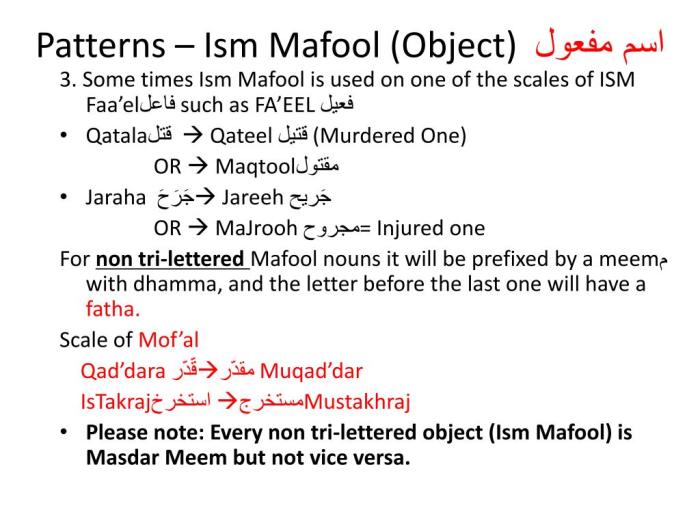As ism fail and ism mafool take center stage, this exploration delves into the historical and cultural significance of these terms, examining their impact on societal norms and behaviors. Prepare to embark on a journey that unravels the intricacies of these expressions and their enduring influence.
Throughout history, ism fail and ism mafool have shaped social interactions and cultural references, leaving an indelible mark on the tapestry of human civilization. This exploration will uncover the nuances of these terms, tracing their evolution and shedding light on their contemporary usage.
Overview of ‘ism fail’ and ‘ism mafool’
In Arabic grammar, ‘ism fail’ and ‘ism mafool’ are two types of nouns that play specific roles in a sentence. Understanding their meanings and usage is crucial for comprehending Arabic grammar.
‘ism fail’ (فاعل), Ism fail and ism mafool
‘Ism fail’ literally means “doer” or “subject.” It refers to the noun that performs the action in a sentence. For example, in the sentence “The boy kicked the ball,” “boy” is the ‘ism fail’ because it is the one performing the action of kicking.
‘ism mafool’ (مفعول)
‘Ism mafool’ literally means “object” or “receiver of the action.” It refers to the noun that receives the action in a sentence. In the same example, “ball” is the ‘ism mafool’ because it is the object of the action of kicking.
Historical Context

The terms “ism fail” and “ism mafool” have a rich history in Arabic grammar and have evolved over time.
The earliest known examples of these terms can be traced back to the pre-Islamic era, where they were used to describe grammatical errors and inconsistencies in speech.
Pre-Islamic Period
- During the pre-Islamic period, the concepts of “ism fail” and “ism mafool” were used to distinguish between nouns that could take direct objects (transitive verbs) and those that could not (intransitive verbs).
- For example, the noun “ضرب” (daraba, “to hit”) was considered an “ism fail” because it could take a direct object (e.g., “ضرب زيد عمرا”, daraba Zayd Amran, “Zayd hit Amr”), while the noun “جلس” (jalasa, “to sit”) was considered an “ism mafool” because it could not take a direct object (e.g.,
“*جلس زيد عمرا”, -jalasa Zayd Amran, “Zayd sat Amr”).
Cultural Significance
Ism failand ism mafoolhold significant cultural weight in Arabic-speaking societies. These terms transcend their grammatical functions and have become deeply embedded in the cultural lexicon, influencing language, literature, and everyday expressions.
In the realm of language, ism failand ism mafoolhave inspired a rich vocabulary of related terms, including fa’il(active participle), maf’ul(passive participle), fa’iliyya(active form), and maf’uliyya(passive form). These terms are essential for understanding the intricacies of Arabic grammar and enable precise communication.
In Arabic grammar, ism fail and ism mafool are essential concepts. For example, in the sentence “The doctor diagnosed the patient with leukemia,” “doctor” is the ism fail (subject) and “patient” is the ism mafool (object). This understanding is crucial in comprehending Arabic sentences.
To test your knowledge, take the do I have leukemia quiz . It’s a fun way to reinforce your understanding of ism fail and ism mafool.
Literature and Poetry
In Arabic literature, ism failand ism mafoolplay a pivotal role in shaping poetic devices and literary styles. Poets skillfully employ these terms to create evocative imagery, convey emotions, and explore themes of agency and passivity.
- Personification:Poets often personify inanimate objects or abstract concepts as fa’ils(active agents) or maf’uls(passive recipients) to enhance the vividness and impact of their descriptions.
- Metaphor: Ism failand ism mafoolserve as powerful metaphors for exploring human experiences and emotions. For instance, a person overwhelmed by circumstances may be described as a maf’ul(passive victim), while a determined individual may be portrayed as a fa’il(active agent).
Proverbs and Idioms
Ism failand ism mafoolare deeply ingrained in Arabic proverbs and idioms, reflecting the cultural significance of these grammatical concepts.
- Proverb:” Al-fa’il ma’lum” (The active agent is known) implies that the responsible party will eventually be identified.
- Idiom:” Taht al-mafa’ul” (Under the passive recipient) refers to a situation where someone is being exploited or victimized.
Impact on Society

The terms ‘ism fail’ and ‘ism mafool’ have had a significant impact on society, shaping social norms and behaviors.
These terms have created a culture of fear and distrust, leading to increased polarization and division within communities.
Social Polarization
- The use of these terms has fostered a climate of suspicion and intolerance, where individuals are labeled and ostracized based on their perceived beliefs.
- This has led to a breakdown in communication and dialogue, making it difficult for people to engage in constructive discussions and find common ground.
Related Concepts
The terms ‘ism fail’ and ‘ism mafool’ are closely related to other concepts in Arabic grammar, particularly those dealing with verbal forms and syntax.
One related concept is the ism al-fa’il, which is the noun form of the active participle. The ism al-fa’ildenotes the doer of an action and is similar to the English “-ing” form of a verb (e.g., “the walking man”).
Another related concept is the ism al-maf’ul, which is the noun form of the passive participle. The ism al-maf’uldenotes the recipient of an action and is similar to the English “-ed” form of a verb (e.g., “the broken vase”).
Comparison with Similar Expressions
The terms ‘ism fail’ and ‘ism mafool’ can be compared to similar expressions in other languages.
In English, the terms “active voice” and “passive voice” are used to describe the grammatical construction of a sentence. The active voice emphasizes the doer of an action, while the passive voice emphasizes the recipient of an action.
In Arabic, the ism failand ism mafoolare similar to the active and passive voice, respectively. However, there are some subtle differences between the two.
- The ism failis used to denote the doer of an action that is ongoing or habitual.
- The ism mafoolis used to denote the recipient of an action that is completed or perfective.
Contemporary Usage

In modern communication and media, ‘ism fail’ and ‘ism mafool’ continue to be widely used, albeit with some subtle shifts in meaning.
Online Communication
On social media platforms and online forums, these terms are often employed to criticize or mock individuals or groups perceived as exhibiting excessive pride or entitlement. For instance, someone might be labeled as an ‘ism fail’ for bragging about their accomplishments or a ‘mafool’ for believing they are superior to others.
Future Implications
The future implications of ‘ism fail’ and ‘ism mafool’ are vast and uncertain. These terms have the potential to continue shaping societal norms and values in the years to come, influencing how we perceive and interact with each other.
Evolution of the Terms
As society evolves, so too may the meanings and usage of ‘ism fail’ and ‘ism mafool’. These terms could become more widely accepted and used, or they may fade into obscurity. It is also possible that they may take on new meanings or connotations.
Impact on Society
The continued use of ‘ism fail’ and ‘ism mafool’ could have a significant impact on society. These terms can perpetuate negative stereotypes and reinforce biases. They can also create a culture of fear and division, making it difficult for people to have open and honest conversations about important issues.
Positive Potential
Despite the potential negative consequences, ‘ism fail’ and ‘ism mafool’ can also be used for positive purposes. These terms can raise awareness of discrimination and prejudice, and they can encourage people to challenge harmful stereotypes. They can also be used to promote empathy and understanding.
FAQ Compilation: Ism Fail And Ism Mafool
What is the literal meaning of ism fail?
Ism fail translates to “agent noun” and refers to a person or thing that performs an action.
How has ism mafool been used historically?
Ism mafool has been employed in various historical contexts to denote the recipient of an action.
What is the cultural significance of ism fail and ism mafool?
These terms hold cultural significance as they reflect societal values and norms, often appearing in proverbs and idioms.
How do ism fail and ism mafool impact society?
They shape social interactions by influencing perceptions of agency and responsibility.